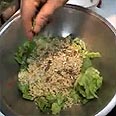
Nature’s bounty
In order to learn about proper nutrition, consult your stomach
Once upon a time, all these things told the story of our food. They showed a Jerusalemite doctor how to treat his heartburn patients; they aided midwives in their search for nutritious food for pregnant women; and they led scholars down the paths of health and healing.
Today, these items have been practically erased from our memories. Now, we have table salt, food coloring, seasoned snacks, and copious amounts of sugar, and in cases of deficiency, we immediately add dietary supplements.
Conventional wisdom holds that our forefathers could have only dreamt about all this abundance and about science’s contribution to elongated life spans. However, it’s far from certain that they themselves would have agreed.
During the 14th century, the philosopher Ibn Khaldun wrote that “the source of all disease lies in food.” Just like that – direct and to the point.
He then added that city dwellers get sick more often “due to the abundance of their substance and their great amounts of food. And since they do not suffice with one type of food and they are not careful about mealtimes… it generates an odd compound in the food, which is largely unfit for the body and its organs.”
Yes, he wrote during the 14th century. Yes, even then he cautioned that abundance causes disease.
Nevertheless, with respect to nomads, he noted that they “eat a little and endure hunger frequently. Spices are limited in their fare, and their dishes are simple. They are constantly in motion. They exist in air that is without rancidity.
"Therefore, their digestion is more complete, and their bodies’ temperaments are healthier and further from sickness… Therefore, there are no doctors in the desert at all… The only reason for this is that there is no need for them.” (From “Introduction to the Science of History”, Bialik Publications)
Millennia’s worth of knowledge waits for us to find the keys which we have discarded and search for the flavor which we have abandoned. The question is: Are we prepared to open this door?
Don’t let anyone tell you otherwise; it’s impossible to learn about nutrition without consulting your stomach. In order to teach others how to eat, you must first know how a freshly picked cucumber tastes, what happens to chickpeas when they are cooked, and how bread rises.
Most of our own knowledge comes from daily life, cooking, reading, listening to our bodies, and learning from others’ experiences. When you observe how food interacts with your body, you will discover how to heed your body. What causes constipation? What provides energy? How does your body cleanse itself? You will soon become accustomed to think before eating and to enjoy every bite.
Our kitchen no longer contains any processed food. We now appreciate organic produce, invest time and effort in our food preparation, avoid harmful substances, eat less, and use only fresh, local and seasonal ingredients.
Autumn vegetable salad
Autumn vegetable salad is a great way to use all the greens that are currently in season. The cranberries, which are beneficial for the urinary tract, introduce a delicate tartness. When in season, add pears or apples to taste.
Ingredients:
2 chopped cucumbers
2 handfuls of mung bean sprouts
Finely chopped green onions
½ package of parsley – chopped
1 package of dill leaves – chopped
1 handful of coarsely shredded rocket
6-7 large lettuce leaves – coarsely shredded
1 chopped apple
3½ ounces of dried organic cranberries
Juice of one lemon
2 TBSP olive oil
Directions:
Mix all ingredients, except for the olive oil, in a bowl. Let sit for several minutes. Add olive oil, and toss.
Baked beet salad
Beet season has just begun. The bright red beets are fresh, and their flavor is strong and sweet. Use just a few quality ingredients in order to emphasize the beets’ flavor. Caution: people who aren’t used to eating beets may be alarmed to see purplish-red in the bathroom. Don’t worry. It’s not blood. It’s the beets, and everything is fine.
Ingredients:
2 fresh beets, rinsed
Juice from ½ a lemon
1 TBSP soy sauce
1 red onion, thinly sliced
Chopped parsley
Directions:
Bake the whole beets, either covered or uncovered, at 350 degrees for one hour. Let cool. Remove ends, and chop into small cubes. If the beet was baked covered, add the liquid from the pan to the salad. Place the beet cubes in a bowl, and add the remaining ingredients. Mix through.
Tali and Uri Meir-Chizik live in Kfar Yehoshua, cook and eat healthy foods, and are Aya’s proud parents. Tali markets organic food, and Uri is a nutritional consultant, a researcher, and a nutritional history expert. Uri leads cooking workshops and courses on healthful diets










